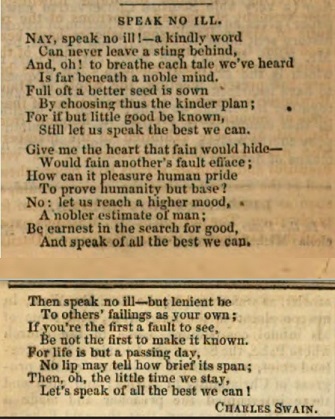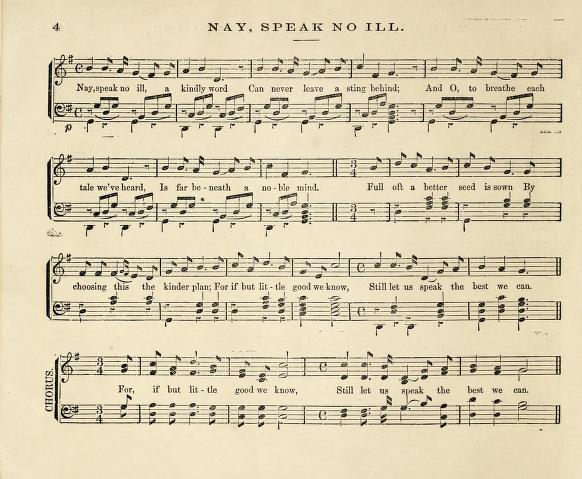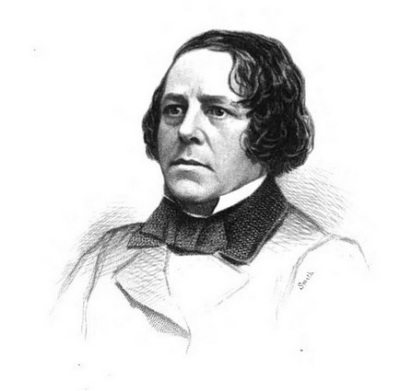The works of English poet Charles Swain (1801-1874) were popular among the early Latter-day Saints, as evidenced by their frequent appearance in early Church periodicals. It should therefore come as no surprise to learn that one of his poems eventually found its way into the Latter-day Saint hymn book.

This hymn, “Nay, Speak No Ill,” was first published on December 13, 1845, in the London Literary Gazette and Journal of Belles Lettres, Arts, Science, Etc., under the title “Speak No Ill.” It was later included in Swain’s Dramatic Chapters, Poems and Songs (1847), and in his Songs and Ballads (1867). It was borrowed by the Latter-day Saints and published in the Millennial Star on September 25, 1876. It has since appeared in various Primary song books, and entered the official Church hymnal in 1948.
The 1985 hymnal originally listed both words and music of this hymn as “Anon., ca. 1894.” In later printings this was changed to “Anon., ca. 1853.” Karen Lynn Davidson, in Our Latter-day Saint Hymns, points out that the words were published anonymously in the Deseret News in 1853. But while this explains the date given for the text, it does not address the source for the tune. There is no evidence this tune, named KINDLY WORD in the 1985 hymnal, was published in 1853.
“Nay, Speak No Ill” has been set to music by many different composers, including George F. Root and William B. Bradbury, but none of these tunes is the musical setting found in the Latter-day Saint hymnal. The earliest known publication of this melody is in Eliza R. Snow’s Tune Book for the Primary Associations of the Children of Zion (1880).
This small collection, also known as the Children’s Primary Tune Book, is only forty pages in length and contains the music for fifty-nine different songs and hymns. It was published as a companion volume to a larger words only collection (also compiled by Snow), entitled Hymns and Songs: Selected from Various Authors, for the Primary Associations of the Children of Zion (1880). Of the fifty-nine songs in this collection, only fourteen of them give the name or initials of the song’s composer, and each of these individuals named is a member of the Church of Jesus Christ of Latter-day Saints. Many of the tunes without a composer’s name listed are known to have originated elsewhere. “Nay, Speak No Ill,” found on page four, does not include a composer’s name, suggesting its tune was likely borrowed from an earlier non-Latter-day Saint source. Unfortunately, the sources from which Snow might have borrowed when compiling her collection are unknown. Further research is needed to find an earlier publication date for this tune.

Charles Swain, popularly known as the “Manchester Poet,” was born in Manchester, England, on January 4, 1801, to John and Caroline (Tavaré) Swain. His father died before he turned six years old, leaving the family in meager conditions. Charles was educated at a small school in the neighborhood of his home by the Rev. William Johns, but due to his mother’s limited income was forced to quit school at the age of fifteen, and was sent to work work as a clerk in a dye-works establishment owned by his uncle, Charles Tavaré.
After fourteen years working for his uncle, Swain left the dye-works business and established a bookseller and publishing company, Swain and Dewhurst, but this venture was short-lived. Shortly afterwards he joined the engraving firm of Lockett & Co., in Manchester, and eventually purchased a portion of the business. He worked in the engraving business for the remainder of his life.
Swain began to write poetry as a young boy. His first published poem, “To Thalia” appeared in the Manchester Iris on April 15, 1822, when he was twenty one years old. His first volume of poems, Metrical Essays, was published in 1827. His other works include Dryburgh Abbey (1832), Letters of Laura d’Auverne (1853), and Songs and Ballads (1867). The Mind, and Other Poems (1831) is often cited as his best work. Many of Swain’s poems were set to music and attained wide popularity in both England and America.
Swain was greatly esteemed in Manchester, where he was made an honorary professor of poetry at the Manchester Royal Institution. He was granted a civil list pension in 1856. He died at Prestwick Park, near Manchester, at the house given to him by his friends, on September 22, 1874, and was buried in the old Prestwick Churchyard. Swain was survived by his wife, Anne Glover, whom he married in 1827, and four of his six children.
Notes:
*The date of Swain’s birth is a matter of dispute. Many sources give 1803 as the year of his birth, but more recent evidence indicates he was actually born in 1801.
* Eliza R. Snow enlisted the help of Dr. Ellen B. Ferguson (1844-1920) to arrange the music for the Children’s Primary Song Book. Ferguson also contributed four original tunes to this collection, all published under her initials E. B. F.
Sources:
Charles Swain, “Speak No Ill,” Literary Gazette and Journal of Belles Lettres, Arts, Science, Etc., December 13, 1845, 829-830; Charles Swain, Poems (Boston: Roberts Brothers, 1871), v; Karen Lynn Davidson, Our Latter-Day Hymns: The Stories and the Messages (Salt Lake City: Deseret Book Company, 1988), 242; “Death of Charles Swain,” Lancaster Gazette (Lancaster, England), September 26, 1874, 2; “The Late Charles Swain,” Morning Post (London, England), September 25, 1874, 6; Sidney Lee, ed., The Dictionary of National Biography, Vol. 55 Stow—Taylor (London: Smith, Elder, & Co., 1898), 189-190; Eliza R. Snow, Tune Book for the Primary Associations of the Children of Zion (Salt Lake City: Juvenile Instructor Office, 1880), 4; Aurelia Spencer Rogers, Life Sketches of Orson Spencer and Others, and History of Primary Work (Salt Lake City: Geo. Q. Cannon & Sons Company, 1898), 222.
Thank you for all of the research you’re doing!
While researching another hymn, I ran across the life sketch of Elizabeth Foster (Lindsay) Thomas, wife of Charles J. Thomas (Tabernacle Choir director). It may provide a hint for the origin of the tune of “Nay, Speak No Ill”:
https://www.familysearch.org/tree/person/details/KWJQ-P6B
According to the account, Elizabeth was familiar with the hymn as one she had heard in Scotland. Later, in Utah, she repeated it from memory for Charles, who wrote it down roughly as she remembered it (how roughly is unknown).
LikeLiked by 1 person
Samuel,
Thank you so much for sharing this information. I probably would not have found it on my own.
And thank you for all the work you are doing. Singpraises is an invaluable resource.
LikeLiked by 1 person